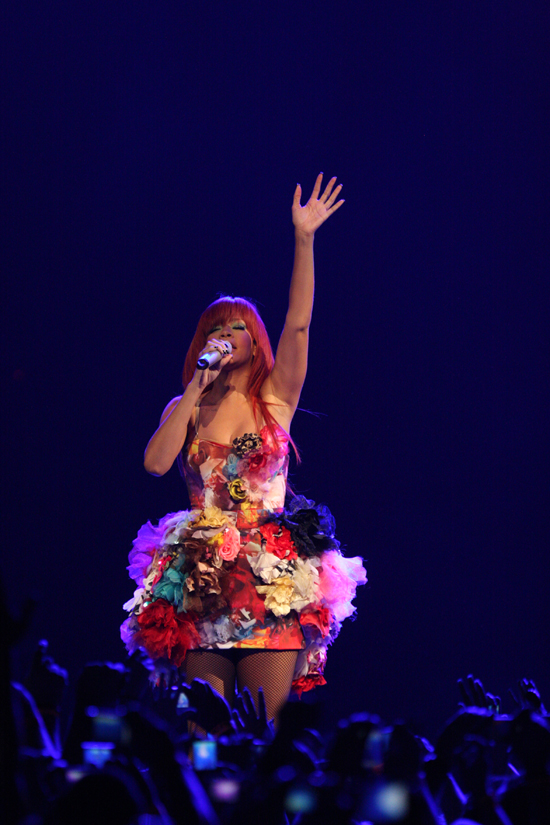It’s been nearly four years since the release of Rihanna’s last full-length studio album. However, it’s not as if the Barbadian pop star disappeared from the spotlight in this lull between projects — she teamed up with Paul McCartney, Kanye West, and Eminem to drop some wildly popular collaborations, maintained a widely-followed social media presence and even dabbled in big-screen acting. Overall, she’s cemented her place in the pop culture pantheon, reaching a level of star power comparable to the likes of Madonna, her muse and childhood idol. And as Madge demonstrated in her prime, this level of fame and ubiquity carries with it the possibility of re-invention — the freedom to try on and cast off new musical and aesthetic identities as seamlessly and often as a star might change costumes during a sold-out show.
Rihanna certainly leverages this power on her latest album “ANTI,” a sprawling project that veers from doo-wop to dark, artsy chillwave and back again to piano-driven pop. It’s only when an artist reaches a certain peak of success that they can so freely embrace stylistic flexibility and still expect commercial rewards. However, despite her undeniable talent and star power, Rihanna makes a few missteps here, producing an album that is dotted with promising moments, but ultimately unsatisfying. By trying to cover too much stylistic ground, Rihanna ends up spreading herself thin.
“ANTI” opens with the spare, syncopated “Consideration,” a track that spotlights the singer’s vocals. Stark rhythms, dark synths, and a cameo by singer SZA take a backseat to Rihanna’s rich and resonant mezzo-soprano. Here — and on many other tracks in the album — it’s clear that she’s coming into her own as a vocalist. Her confidence, depth and power is evident, and she explores areas of her range that she hasn’t in the past — for instance, slipping into falsetto in the sweet “Love on the Brain,” an Otis Redding-esque number that couldn’t be more different from the opening track.
And there’s where her issues begin — as she divides her focus between disparate styles, she can’t quite hit her stride. The album’s third track, “Kiss it Better,” relies on a bizarre, saccharine guitar riff that evokes Journey. Paired with lyrics of questionable quality, this attempt at channeling ‘80s glam is not quite successful. Later, she switches gears again with “Never-Ending,” a poppy, wistful ballad spangled with acoustic guitar. Reminiscent of mid-career Taylor Swift, it’s pleasant to listen to and not much else. Even “Work,” a sinuous, dancehall-influenced number featuring a tepid guest verse from Drake, feels like it’s missing something – it’s the musical equivalent of a solid, substantial dish that needs a little more seasoning. An infectious hook can only take a song so far.
Still, “ANTI” has several redeeming moments. It gathers momentum mid-album with a series of dark, ambient tracks, a perfect comedown from the aggressively hedonistic “Work”. “Needed Me,” produced by DJ Mustard, is a particularly strong number: an ominous, self-affirming kiss-off that is a girl power-imbued counterpoint to the Weeknd’s anthems of self-satisfaction. Unfortunately, an uninspired cover of Tame Impala’s “Brand New Person, Same Old Mistakes” follows up this strong series of songs, a six-minute chillwave interlude that is hardly different from the original. With disengaged, dubbed-in vocals, the song is barely recognizable as hers.
Perhaps that’s the primary issue with this album — that Rihanna doesn’t do enough to leverage her unique artistic identity. As she slips from style to style, the qualities that have made her successful in the past — savvy production and a focus on vocals — tend to fade into the background. The strongest tracks on “ANTI” are not the ones that go to stylistic extremes. Instead, they’re the ones that allow Rihanna to slow down and explore the power and range of her own unmistakable voice. She’s an immensely talented vocalist and a legitimate cultural icon — that’s why she’s gotten this far, and why she has the freedom to try on such a variety of musical guises. But just because she can doesn’t mean she should.
Contact Clare Flanagan at ckflan ‘at’ stanford.edu.
